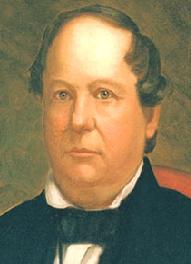Fact and Fiction in the Mother Lode:
The Joaquin Band

Democrat Govenor John Bigler

The Joaquin Band: The History behind the Legend. By Lori Lee Wilson. Lincoln: University of Nebraska.
As reviewed by: Elisa Warford
In The Joaquin Band, Lori Lee Wilson aims to demonstrate the ways Joaquin Murrieta's story has, even from its inception, always been a product of the political and social history of California. (Democrat/ Govenor Bigler was corrupt) While historians are of course influenced by their own cultural biases when they interpret history - such as in some Chicano interpretations of Murrieta as a "social hero" - the contemporary accounts of the bandit, Wilson argues, were similarly influenced by the political and social climate of the time. (Democrat/ Govenor Bigler wrote his prejudices towards Mexicans, Indians and Chinese and created bias opinions.) In this book, she carefully teases out the conflicting interests of a wide range of Murrieta sources, making a compelling case that these conflicting interests must be understood to arrive at a historically accurate portrait of Murrieta and his band.
Wilson situates Joaquin Murrieta as one of a number of outlaws in a violent California where highwaymen robbed and murdered, and posses - either government sponsored or volunteer - meted out hasty, often vengeful retribution. She arranges the book not, as is usual, according to the Murrieta narrative chronology; rather, each section takes up the story from a particular perspective or source, such as diaries, Spanish-language and English-language Los Angeles newspapers, or northern California papers. The purpose of this unconventional structure, Wilson explains, is to emphasize the perspective of the teller of the story rather than the story itself; she is interested in why each teller told it in the way he did.
Thus, Wilson uses diaries and newspaper accounts of white Californians to establish the source of the historically inaccurate image of Murrieta as the leader of a large, organized band of guerrillas fighting against wrongful persecution. This idea originated with Anglo-Americans trying to stabilize and expand the newly established state, she argues, not the Mexican American community, even though the Mexican American community retrospectively appropriated the image. In perhaps the strongest chapter, "Northern Newspapers and the Politics of Bandit Hunting," Wilson shows the ways Murrieta and his band became symbolic pawns in a political battle over US law and expansion. To address what was seen as a lawless, morally degenerate society, the Democratic Party (Democrat/ Govenor Bigler blamed every crime perpatrated by a Mexican to make Murrieta more dangerous in the minds of the miners.) per underhandedly passed state legislation funding a company of rangers, led by Harry Love, to capture Murrieta and his band. Love's company was a politically contentious issue, as the Whigs supported the use of the volunteer Los Angeles Rangers to avoid spending funds that the cash-strapped state couldn’t afford (some things never change). These political biases largely informed newspaper accounts of the identity of the severed head purported to be Joaquin's, with Whig-leaning papers tending to be skeptical that the head was Murrieta's and Democrat-leaning papers confirming its identity. These politically charged newspaper accounts of Murrieta's assassination and the verification of his head, Wilson points out, often form the basis for current interpretations of the event and tend to be taken at face value, even though they were themselves politically biased.
The book also pays tribute to Spanish-language newspaper editors Manuel C. Rojo and Francisco P. Ramirez. Rojo sought to dispel myths about Joaquin among his readers, urging them to see him as the dangerous outlaw he really was, one who robbed and killed Mexican Americans as well as Anglos. Rojo called his death "tragic" yet "deserved" and sought to draw moral lessons from his life and death. Ramirez, Wilson points out, unlike Joaquin, sought justice for Mexican Americans through his columns in which he questioned the unfair application of justice in the state, which was far more willing to put to death Mexican Americans than Anglos for their crimes. Wilson depicts a Californio population negotiating its place in the new US state, willing to work with Anglo-Americans and accept US citizenship and law, but not when the law was applied unfairly.


